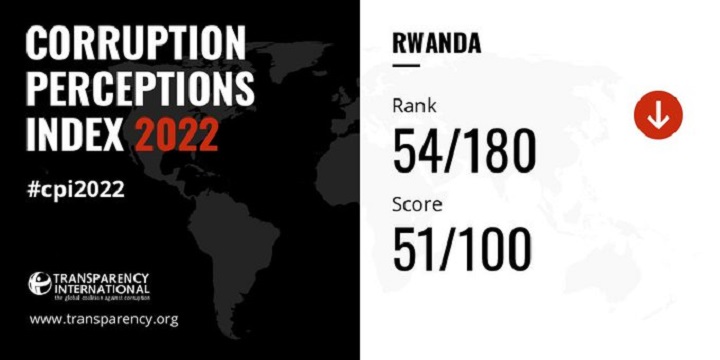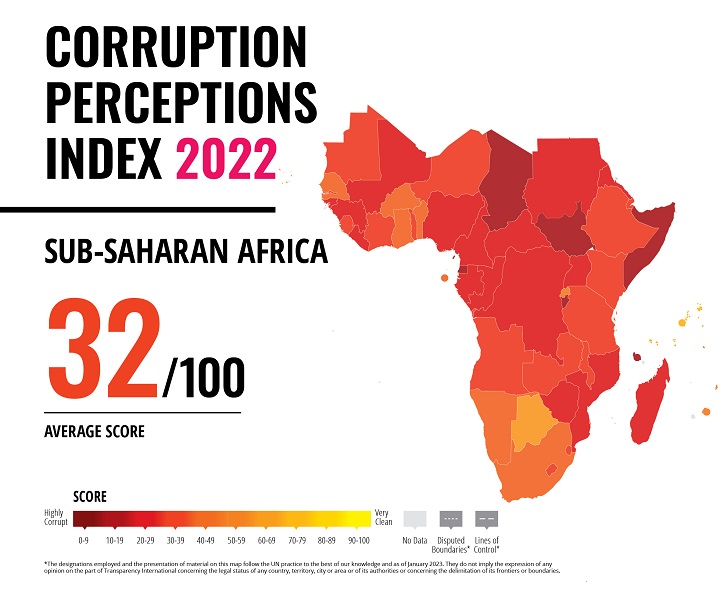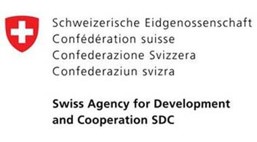Press Conference on the Launch of Corruption Perceptions Index (CPI) 2022


On 31st January 2022, Transparency International launched the findings of the Corruption Perceptions Index (CPI) 2022 under the theme : “Corruption, Conflict and Security”. On the same day, Transparency International Rwanda (TI-RW) held a press conference to share insights on the CPI 2022 score at the global, regional and national level.
The CPI 2022 shows that corruption level in Rwanda remains at a standstill for years (with 53% average score since 2012). However, on CPI 2022, with 51% score, Rwanda dropped two points (from 53% in 2021 and 54% in 2020).
As the CPI 2022 reveals, with 51% score, Rwanda is ranked fourth as the least corrupt country in Africa and Sub-Saharan Africa region (from fifth in 2021), the first in East Africa and 54th on the global rank (from 52nd in 2021).
In East African Region, Rwanda is followed by Tanzania (94th with 38%), Kenya (123th with 32%), Uganda, (142nd with 26%), DRC (166th with 20%) and Burundi (171st with 17%).
In her remarks, TI-RW Chairperson Ingabire Marie Immaculée underpinned that Rwanda has made a remarkable progress in the fight against corruption. She, however, said a lot need to be done to achieve set goals and have the desirable scores.
"Despite the existing high political will and zero tolerance to corruption, the level of corruption remains standstill and the progress is a bit scant. At this juncture, all stakeholders need to renew their commitments and harmonize collaboration." Ingabire added.
According to Hon. Mukama Abbas, the Deputy Ombudsman in charge of Preventing and Fighting Corruption, hinging on Rwanda ’s score and rank on CPI 2022, being among the top four best performers in Africa proves the government’s commendable efforts in the fight against corruption.
"Our vision is to be the first country globally on the fight against corruption by 2050. The efforts made are very commendable, but it means we still have a long journey to go, and we cannot say we are satisfied with the current score." Hon. Mukama added.


The CPI 2022 Rwanda’s score has been derived from six sources which are :
![]() Global Insights Country Risk Ratings (59%)
Global Insights Country Risk Ratings (59%)
![]() World Justice Project Rule of Law Index (58%)
World Justice Project Rule of Law Index (58%)
![]() Varieties of Democracy Project (56%)
Varieties of Democracy Project (56%)
![]() African Development Bank CPIA (49%)
African Development Bank CPIA (49%)
![]() World Bank CPIA (43%)
World Bank CPIA (43%)
![]() Bertelsmann Foundation Transformation Index (37%)
Bertelsmann Foundation Transformation Index (37%)
GLOBAL HIGHLIGHTS : 2022 Corruption Perceptions Index reveals scant progress against corruption as world becomes more violent
The 2022 Corruption Perceptions Index (CPI) shows that most of the world continues to fail to fight corruption : 95 per cent of countries have made little to no progress since 2017.
The Global Peace Index shows the world continues to become a less peaceful place. According to TI, there is a clear connection between this violence and corruption, with countries that score lowest in this index also scoring very low on the CPI. Governments hampered by corruption lack the capacity to protect the people, while public discontent is more likely to turn into violence.
Delia Ferreira Rubio, Chair of Transparency International said : “Corruption has made our world a more dangerous place. As governments have collectively failed to make progress against it, they fuel the current rise in violence and conflict – and endanger people everywhere. The only way out is for states to do the hard work, rooting out corruption at all levels to ensure governments work for all people, not just an elite few.”
The CPI ranks 180 countries and territories by their perceived levels of public sector corruption on a scale of zero (highly corrupt) to 100 (very clean).
The CPI global average remains unchanged at 43 for the eleventh year in a row, and more than two-thirds of countries have a serious problem with corruption, scoring below 50.
![]() Denmark (90) tops the index this year, with Finland and New Zealand following closely, both at 87. Strong democratic institutions and regard for human rights also make these countries some of the most peaceful in the world according to the Global Peace Index.
Denmark (90) tops the index this year, with Finland and New Zealand following closely, both at 87. Strong democratic institutions and regard for human rights also make these countries some of the most peaceful in the world according to the Global Peace Index.
![]() South Sudan (13), Syria (13) and Somalia (12), all of which are embroiled in protracted conflict, remain at the bottom of the CPI.
South Sudan (13), Syria (13) and Somalia (12), all of which are embroiled in protracted conflict, remain at the bottom of the CPI.
![]() 26 countries – among them Qatar (58), Guatemala (24) and the United Kingdom (73) – are all at historic lows this year.
26 countries – among them Qatar (58), Guatemala (24) and the United Kingdom (73) – are all at historic lows this year.
Since 2017, ten countries significantly declined on their CPI scores.
![]() The significant decliners are : Luxembourg (77), Canada (74), the United Kingdom (73), Austria (71), Malaysia (47), Mongolia (33), Pakistan (27), Honduras (23), Nicaragua (19) and Haiti (17).
The significant decliners are : Luxembourg (77), Canada (74), the United Kingdom (73), Austria (71), Malaysia (47), Mongolia (33), Pakistan (27), Honduras (23), Nicaragua (19) and Haiti (17).
![]() Eight countries improved on the CPI during that same period : Ireland (77), South Korea (63), Armenia (46), Vietnam (42), the Maldives (40), Moldova (39), Angola (33) and Uzbekistan (31).
Eight countries improved on the CPI during that same period : Ireland (77), South Korea (63), Armenia (46), Vietnam (42), the Maldives (40), Moldova (39), Angola (33) and Uzbekistan (31).
SUB-SAHARAN AFRICA HIGHLIGHTS

The Sub-Saharan Africa average remains the lowest in the world, dropping a point this year to 32 (from 34 in 2021).
![]() Seychelles tops the Sub-Saharan Africa region (23rd on the global rank with 70% score) followed by Cabo Verde and Botswana (35th with 60% respectively), Rwanda (54th with 51%) and Mauritius (57th with 50%).
Seychelles tops the Sub-Saharan Africa region (23rd on the global rank with 70% score) followed by Cabo Verde and Botswana (35th with 60% respectively), Rwanda (54th with 51%) and Mauritius (57th with 50%).
![]() Burundi (17), Equatorial Guinea (17), South Sudan (13) and Somalia (12) score lowest in the region.
Burundi (17), Equatorial Guinea (17), South Sudan (13) and Somalia (12) score lowest in the region.
![]() Lesotho (37), Eswatini (30), Gabon (29), Liberia (26) and Comoros (19) are all at historic lows this year.
Lesotho (37), Eswatini (30), Gabon (29), Liberia (26) and Comoros (19) are all at historic lows this year.
![]() Since 2017, only Angola has significantly improved on the CPI (with 33 in 2022 from 19 in 2017).
Since 2017, only Angola has significantly improved on the CPI (with 33 in 2022 from 19 in 2017).
CPI 2022 THEME : CORRUPTION, CONFLICT AND SECURITY
Corruption, conflict and security are profoundly intertwined. The misuse, embezzlement or theft of public funds can deprive the very institutions in charge of protecting citizens, enforcing the rule of law and guarding the peace of the resources they need to fulfil that mandate. Criminal and terrorist groups are often aided by the complicity of corrupt public officials, law enforcement authorities, judges and politicians, which allows them to thrive and operate with impunity.
• The Russian invasion of Ukraine in February 2022 was a stark reminder of the threat that corruption and the absence of government accountability pose for global peace and security : kleptocrats in Russia (28) have amassed great fortunes by pledging loyalty to President Vladimir Putin in exchange for profitable government contracts and protection of their economic interests. The absence of any checks on Putin’s power allowed him to pursue his geopolitical ambitions with impunity. This attack destabilised the European continent, threatening democracy and killing tens of thousands.
• After decades of conflict, South Sudan (13) is in a major humanitarian crisis with more than half of the population facing acute food insecurity – and corruption is exacerbating the situation. A Sentry report from last year revealed that a massive fraud scheme by a network of corrupt politicians with ties to the president’s family siphoned off aid for food, fuel and medicine.
• The combination of corruption, authoritarianism and an economic downturn has proved especially volatile in Brazil (38), where President Jair Bolsonaro’s term was marked by the dismantling of anti-corruption frameworks, the use of corrupt schemes to favour political allies and amass political support in the legislature, disinformation and attacks on civic space. In January, after Bolsonaro lost his re-election bid, his supporters launched a violent attack against the parliament, supreme court and presidential palace, threatening the lives of police officers and journalists and vandalising buildings, with the goal of disrupting the peaceful transition of power to newly elected President Luiz Inácio Lula da Silva.
• Complaints of corruption helped spark civil war in Yemen (16) eight years ago. Now, the state has collapsed, leaving two-thirds of the population without sufficient food – one of the worst humanitarian crises in the world.
• Even in countries with relatively strong measures against corruption, the defence sector often remains secretive – opening the door for undue influence and other forms of corruption. According to the Government Defence Integrity Index, only nine countries out of the 85 assessed have a low or a very low risk of corruption. This is particularly troubling as many governments prepare to ramp up their military spending in response to emerging threats and in response to the war in Ukraine. In Germany (79), for example, the government has set up a new 100 billion euro fund to revamp its military, but such simplified procurement opens up significant risks for corruption. However, a new national security strategy currently being debated within the government could help to strengthen integrity and transparency mechanisms if adopted.
ABOUT THE CORRUPTION PERCEPTIONS INDEX
Since its inception in 1995, the Corruption Perceptions Index has become the leading global indicator of public sector corruption. The index scores 180 countries and territories around the world based on perceptions of public sector corruption, using data from 13 external sources, including the World Bank, World Economic Forum, private risk and consulting companies, think tanks and others. The scores reflect the views of experts and business people.
The process for calculating the CPI is regularly reviewed to make sure it is as robust and coherent as possible, most recently by the European Commission’s Joint Research Centre in 2017. All the CPI scores since 2012 are comparable from one year to the next. For more information, see this article : The ABCs of the CPI : How the Corruption Perceptions Index is calculated.

















